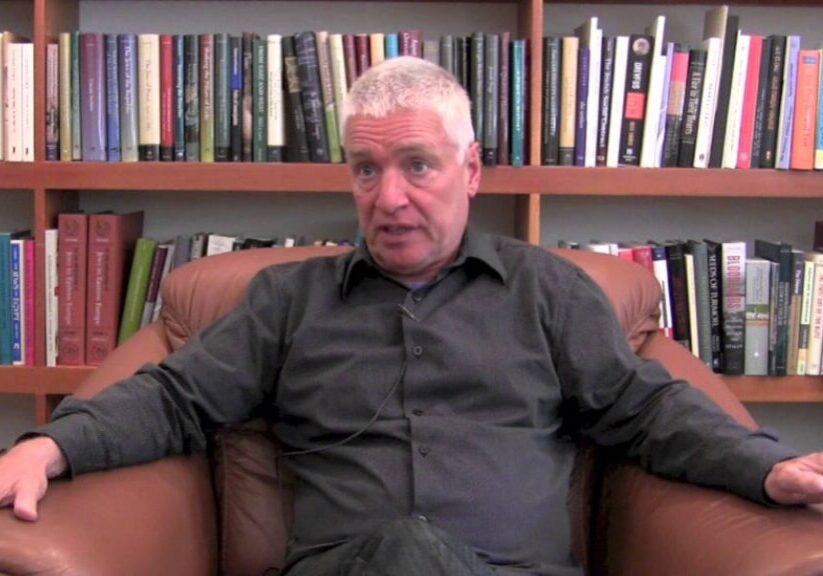Australia/Israel Review
It’s Academic
Aug 1, 2006 | Ted Lapkin
Anti-Zionism in Australian academia
By Ted Lapkin
The dominant political culture on Australian university campuses brings to mind a scene from the classic movie Casablanca. A naïve young woman approaches the nightclub owner Rick Blaine (Humphrey Bogart) to enquire about the character of the thoroughly dissolute French police captain played by Claude Raines. “He’s like any other man, only more so,” quips the jaded Bogart in response.
 |
 |
 |
| From top: Prof. Amin Saikal, Prof. Andrew Vincent, Antony Loewenstein |
And in paraphrased form, this witticism could easily be applied to Australian higher education, where all the pernicious norms of politicised academia have taken root with a vengeance. When it comes to Marxist dogma, queer theory — and yes, anti-Zionism — Australian campuses are like most other Western universities, only more so.
The ubiquity of Left-wing politics within Australian academia means that the task of writing about campus Israel-phobia requires a solid sense of discrimination.
I have thus applied the principles of journalistic triage to this essay, focusing solely on a handful of Australia’s most egregious university anti-Zionists. And while there are many likely candidates who might be eligible for nomination, the Oscar for anti-Israel virulence undoubtedly goes to the University of Sydney’s Evan Jones.
Jones’ day job involves the teaching of economics. But his true passion comes to light in a web-log (“blog”) that is particularly venomous, even by the incendiary standards of the Leftist blogosphere. Entitled “Alert and Alarmed”, this blog is an obvious play on the slogan of an Australian government public awareness campaign on terrorism, “alert, but not alarmed.”
While Evan Jones detests the Bush administration and the Australian government of John Howard, there’s nothing that moves him quite like the question of Israel. His anti-Zionist animus runs so deep that he exemplifies the argument that hostility to the Jewish state is synonymous with hostility to Jews, per se. Yet the very fervency of Jones’ hostility towards Israel renders him tone deaf to the antisemitic overtones of his rhetoric.
Take for example, Jones’ oft expressed view that the Jews dominate press coverage on issues relating to Israel. A typical example of his belief in Jewish media omnipotence emerged in a blog posting that appeared under the title “The Wall and ‘topographical considerations:’”
All university programs in politics should have a compulsory unit on propaganda, and all such units should include a compulsory component on Israeli propaganda. The Israeli propaganda machine makes the Nazi apparatus under Geobels [sic] look like amateur hour. (23 July 2005)
Of course, in reality the Israelis are far more Keystone Cop than smooth operator when it comes to the game of hasbara, as public relations are known in Hebrew. The ineptitude demonstrated by Israel in its dealings with the media has caused much gnashing of teeth amongst Zionist advocates Down Under. The opinion pages of Australia’s newspapers regularly feature Leftist critics of Israel. The ABC, our premier publicly funded broadcaster, models itself on its UK big brother, with predictably dismal results in its Middle East coverage.
Yet despite this surfeit of evidence to the contrary, Professor Evan Jones remains fixated by the idea that pro-Israel Jews dominate the journalistic profession – lock, stock and barrel. He dismisses America’s pre-eminent business newspaper as the “reactionary war-mongering Zionist Wall Street Journal” (9 February 2006). And the British writer of a pro-Israel letter to the editor of the Independent newspaper is nothing more than a “lobotomised Zionist” (28 January 2006).
And like Casablanca’s Captain Renault, Evan Jones is constantly rounding up all the usual suspects. Case in point — the Cronulla Beach disturbances of December 2005 that garnered considerable attention from the world media. The riots were the culmination of longstanding ethnic tensions between the Anglo-Australian residents of the seaside area and Australians of Lebanese Muslim extraction who hailed from the southwest Sydney suburbs.
Concentrated some 20 kilometres to the north in the Bondi area, the Sydney Jewish community was a non-factor in the inter-ethnic violence that erupted in Cronulla. Yet this absence of any Jewish connection to the rioting didn’t stop Evan Jones from trotting out his tried and true explanation for all the world’s ills. Seizing on a handful of letters to the editor by Jewish authors that highlighted the undeniable problem of jihadist radicalism within the Australian Muslim community, Jones wrote:
The respectable press is at the centre of respectable racism. Our friends of Israel are at the centre of the raw material for the respectable press. Zionists have carte blanche to display their gut prejudices in public… (21 December 2005)
Or, in other words, those evil Zionist puppeteers who pull the strings of the Australian media were stoking the fires of anti-Arab racism for their own Machiavellian purposes.
This monomaniacal quest for the chimera of conspiratorial Jewish media dominance is obnoxious enough. But the obsessively irrational flavour that taints Evan Jones’ worldview is compounded by another mantra that consistently crops up in his writing: the equation of Zionism with Nazism.
In the world according to Jones, the creation of the Jewish state was accomplished through conscious collaboration with Hitlerean Germany. In support of this fatuous thesis, Jones approvingly cites a dubious assertion that emanates from an even more dubious source: radical Israeli anti-Zionist Uri Davis:
Zionist leaders who have made themselves accomplices by default, and sometimes by deliberate design, to the mass murder of Jews by the Nazi annihilation machinery. [Uri Davis, Apartheid Israel (London 2004)]
And when Melbourne’s Age newspaper found an editorial cartoon comparing Israel and Auschwitz too loathsome, even for its decidedly left-leaning tastes, Evan Jones protested. Jones lauded cartoonist Michael Leunig on the grounds that the artist “juxtaposed the hypocrisy erected on the degradation that was Auschwitz and its gas chambers with the hypocrisy of contemporary Israel.” (21 December 2005)
But not all of Israel’s enemies in Australian academia lend themselves so crudely to caricature as Evan Jones. Some cloak their animus in a veil of pseudo-sophistication that facilitates their access to the media as opinion columnists and expert commentators. And one of the slicker anti-Zionist op-ed contributors is Amin Saikal, who heads the Centre for Arab and Islamic Studies (CAIS) at the Australian National University in Canberra. The CAIS exemplifies the classic economic principle that you usually get what you pay for.
Founded in 1994 under the rubric the Centre for Middle East and Central Asian Studies, CAIS assumed its current title six years later. But this simple change in nomenclature bespoke a much more radical shift in orientation. The genesis of this relabeling stemmed from an influx of funding from various Middle East sources, some of them quite questionable.
In December 2000, the Centre announced the receipt of a $2.5 million donation from Sheik Hamdan bin Rashid al-Maktoum, the brother of the UAE Prime Minister and the Emir of Dubai. This sizeable sum purchased, not only the name change, but also the creation of “Chair of Arab and Islamic Studies” that was eponymous with the title of the Centre. And the Government of Iran chipped in as well. The powers-that-be in Teheran indulged themselves in a minor diversion from their usual interests — promoting terrorism and the pursuit of nuclear weapons — by donating another US$350,000 to the cause. The mullahs’ contribution underwrote the establishment of the Centre’s perpetual foundation in Persian Language and Iranian Studies. In both those cases, the ANU’s “Endowment in Excellence” provided matching funds for these foreign donations, bringing the total amount generated in support of the CAIS to almost A$6 million.
When it comes to the policies of the United States or Israel, the default Amin Saikal position is profoundly negative. If the Americans can at times be excused their folly on account of their terminal naïveté, no such dispensation is granted to Zionists.
Saikal avoids the frothing at the mouth style of Israel’s more extreme animadverters. But his ‘less is more’ approach is more pernicious because, on the surface, it seems so reasonable. At first glance he appears simply to be deploring the violence that plagues the Middle East. Yet closer examination reveals that Saikal’s lamentations are selectively applied in order to satisfy the partisan dictates of his anti-Zionist agenda.
Saikal’s operative rule of thumb holds that Israel can do no right – and the Palestinians can do no wrong. To promote this view, he employs a crafty polemical strategy that sins more by omission than commission. As when he argues that Israeli military strikes against terrorist targets are to be condemned on grounds of morality and practicality – they only make things worse.
Thus when an Israeli airstrike decapitated the Hamas command structure by killing arch-terrorist Sheik Ahmed Yassin, Saikal responded with tidings of gloom and foreboding in Brisbane’s daily newspaper of record. Israel’s action, declared the professor, “will most likely drive more Muslims to identify with the positions of extremists such as Osama bin Laden.” (Courier Mail, 24 March 2004)
He went on to warn: “Israel and its international backers may find this assassination returns to haunt them.” Of course, Saikal had nothing to say about the nightmares inflicted on Israeli civilians through the suicide bombings inspired and orchestrated by Ahmed Yassin.
And this reticence to condemn Palestinian violence against Jewish civilians is so deeply ingrained in Amin Saikal’s worldview that it even infuses his vocabulary. Writing in the Sydney Morning Herald, Saikal accused Israel of using disproportionate force “to contain what it calls terrorism, including suicide bombing.” (10 January 2005) One would think that any objective definition of the term terrorism would encompass such acts as the deliberate bombing of commuter buses, cafes and nightclubs. But not in Amin Saikal’s lexicon. To him, one man’s terrorist seems to be another man’s freedom-fighter.
And despite the ex cathedra tones that pervade his commentary, Saikal demonstrates an embarrassing ignorance of simple geo-strategic matters. One of the more glaring of these factual errors appeared in the Sydney Morning Herald (13 October 2004), where he asserted that the Israeli navy has deployed “nuclear-powered submarines” to launch pre-emptive strikes against Iran. But anyone with even a modicum of Middle East military knowledge knows the Israeli submarine fleet consists of three German-built ‘Dolphin’ class diesel boats. While the Germans make world-class diesel submarines, their own navy doesn’t possess nuclear vessels.
And Saikal also finds heroes in the strangest places. He lauds the Islamic Republic of Iran as a buttress against the evils of American imperialist designs in the Middle East. In fact, the professor views American meddling in the region to be so pernicious that he is even willing to defend the Iranian quest for nuclear weapons.
Of course, Iran doth protest too much that its uranium enrichment facilities are intended solely for research and energy generation purposes. “So despite insisting on the peaceful nature of its nuclear program,” Saikal tells us, “ultimately Teheran may not be averse to the idea of acquiring a nuclear deterrent.”
But even if those wily mullahs are pulling the wool over the world’s eyes, Saikal argues this is entirely understandable given the circumstances that Iran faces. After all, he asserts, “Teheran lives under a perceived serious US and Israeli threat.”
And Amin Saikal’s myopia towards the Islamic Republic is not limited solely to its foreign policy and nuclear weapons program. The ANU professor’s opinion pieces also display an obliviousness to the heinous human rights record of the Iranian ‘mullah-ocracy.’ Iran, he informs us:
has developed a sort of democracy which may not accord with Western ideals, but provides for a degree of mass participation, political pluralism and assurance of certain human rights and freedoms which do not exist in most of the Middle East. (Sydney Morning Herald, 15 January 2003)
In Saikal’s newspaper opinion writing there is nary a mention of Iran’s savage repression towards the Baha’i faith and other religious minorities. He has nothing to say about the reign of terror that is inflicted upon political opponents of the regime by Basiji paramilitary thugs. And the professor is mute on the lethal persecution of gays and lesbians in Teheran and other cities.
But Saikal won’t shut up about the malign influence of a Jewish neo-conservative cabal that he believes holds sway over American foreign policy. In the Sydney Morning Herald (31 October 2003) he wrote of the “neo-conservatives who dominate the [Bush] Administration.” Eight months later in the same newspaper, he explicitly placed the true onus for the war in Iraq on:
a small group of neo-conservatives in the Bush administration who wanted to reshape the Muslim Middle East and radical political Islam according to their vision and geopolitical preferences. (Sydney Morning Herald, 29 June 2004)
Of course, the term “neo-conservative” has engendered substantial controversy of late. Some argue that this term has become a politically correct euphemism used by critics of Zionism as shorthand for Jew. (see Julia Gorin, Wall Street Journal, 23 September 2004) And this is arguably the case with Amin Saikal. In a column for the International Herald Tribune (29 December 2003), the professor explained what he thought this neo-con vision entailed: “The efforts of the neoconservatives dovetail all too effectively with the aims of the radical Zionists who push for more and more Jewish settlements on Palestinian land.”
Thus the gist of Saikal’s argument seems to be that the Iraq war was fought at the behest of the Zionist neo-cons so that Israel could enhance Jewish settlement growth on the West Bank. His views largely echo the thesis of a recent article written by American academics John Mearsheimer and Stephen Walt for the London Review of Books. In fact, during a telephone conversation with me Saikal explicitly praised the Mearsheimer/Walt essay.
But Eliot Cohen of Johns Hopkins University responded to Mearsheimer and Walt (and by extension Amin Saikal) with an opinion piece in the Washington Post (5 April 2006) entitled “Yes it’s anti-Semitic.” The thesis that US foreign policy towards the Middle East was run by Jews for Jews was “a wretched piece of scholarship.” Not only was this “kooky academic work,” said Cohen, but it is “merely, and unforgivably, bigotry.”
And during the telephone conversation that I held with Professor Saikal to solicit his response to my assertions, he steadfastly denied having an ideological agenda. He defended his glowing description of Iranian democracy with the argument that the Teheran regime was “pluralistic within an Islamic context.” I guess that means if you are a Baha’i, Christian or Jew, you’re simply out of luck. And towards the end of our telephonic colloquy, Saikal told me that he would never lower himself to my level by “labeling people.” Shortly afterwards he proceeded to accuse me and my AIJAC colleagues of being “nitpickers” who “have no ethics” and “live in a cuckoos’ nest.” I am extremely grateful to the professor that no labels were hurled.
Equally myopic is Professor Andrew Vincent, who heads the Centre for Middle East and North African Studies at Sydney’s Macquarie University. Like many of his anti-Zionist fellow travellers, Vincent mines the rich ore of Israel-phobic paranoia that has become stock in trade of the far-Left. But last year he hit the mother lode of all modern theories of Levantine foul play in the Macquarie University News, when he postulated: “the Israelis quite possibly murdered Yasser Arafat.” Presumably those dastardly Zionists got away with their plot because:
US foreign policy has been highjacked by a blinkered group of zealots, the neo-conservatives, whose main interest is the security of Israel and the emasculation of any Arab opposition to Israel’s policies. (“The Future of the Middle East,” Macquarie University News, April 2005)
Here again we see the paranoid mantra of malign neo-conservative puppeteers who conspire to pull Washington’s strings on behalf of the Jewish state. Vincent made a half-hearted attempt to insulate himself from criticism over the immoderation inherent to these views by positing them as the “pessimistic scenario” of the Middle East’s future. But he then blew his cover at the end of the article by confessing his belief that “the pessimistic view is more likely to prevail than the optimistic one.”
And Andrew Vincent’s wacky worldview isn’t solely limited to perfervid theories of Capitol Hill kosher conspiracies. In the wake of Saddam Hussein’s invasion of Kuwait in 1990, Vincent wrote a nauseating apologium for Iraqi aggression in Melbourne’s Sunday Herald newspaper (5 August 1990). Citing Iraq’s small coastline and Kuwait’s historic association with Baghdad, Vincent argued that Saddam Hussein had a legitimate case for his expansionist designs.
And more recently Vincent demonstrated similarly blurred judgment when he invited blogger Antony Loewenstein to join the board of the Macquarie Middle East Studies Centre. Loewenstein is a far-left freelance author with a penchant for resumé-inflation and factually challenged anti-Zionist/anti-American vitriol.
Loewenstein’s stance on the war in Iraq is clear and unequivocal. The blogger has long since abandoned any pretence of ‘peace activism,’ coming out squarely on the side of Abu Musab al Zarqawi. In October 2005, the blog “Antony Loewenstein” brazenly declared: “the defeat of America and its allies in Iraq is vital to ensure similiar [sic] acts [of Yankee imperialism] are not carried out again” (26 October 2005). Of course, one of those American allies is Australia. At the time of this writing, the Aussies have a battalion-sized task force of 450 troops serving in al-Mutana province in southern Iraq. Antony Loewenstein is actively calling for the death of his countrymen in order to achieve the humbling of the United States.
Cost of doing business, I suppose.
And while Loewenstein’s attitude towards the Australian Jewry might be less sanguinary, his stance is just as dismissive. It was “bigotry, hatred and intolerance” that motivated Jewish opposition to Palestinian spokeswoman Hanan Ashrawi’s receipt of the Sydney Peace Prize in 2003. (“Hanan Ashrawi and the Price of Dissent,” Znet, 23 October 2003). Honest and honourable feelings of aversion to Ashrawi’s track record are inconceivable to the died-in-the-wool anti-Zionist thinking of Antony Loewenstein.
In Lowenstein’s firmament, Israel is a nation of “apartheid-like policies” (8 August 2005). He was similarly scathing when I published an article in Australia’s national broadsheet newspaper that analysed the impact of Ariel Sharon’s stroke. To the freelancer I was merely one of those “dutiful Zionists who are already lining up to praise the unindicted war criminal” (6 January 2006).
Loewenstein’s superficial knowledge of the Middle East every so often manifests itself in blunders so elementary that they would make a first-year university student blush. One of the more amusing pearls of Loewensteinian wisdom appeared in December 2005, when he referred to a senior female Israeli cabinet minister as a man. In an article for the Leftist online magazine New Matilda, he wrote:
Yet more evidence of Israel speaking the language of ‘peace’ but acting entirely differently came from a senior ally of Sharon, Justice Minister Tzipi Livni. He [sic] told a legal conference in early December that, despite years of Israeli denials, Sharon himself imagines the 425-mile separation barrier as the future border between Israel and a potential Palestinian state. ‘One does not have to be a genius to see that the fence will have implications for the future border,’ he [sic] said. (“A Future for Israel/Palestine?”, New Matilda, 21 December 2005.)
Loewnstein’s gender-bender bungle bespoke both his fundamental ignorance of Israeli politics and his Hebraic illiteracy. Anyone even moderately conversant in Hebrew will know that ‘Tzipi’ is the shortened version of Tzipporah – an unambiguously female name. As one commenter on his blog pointed out:
if Loewenstein can’t even get the gender of an Israeli cabinet minister right, then what does it say about the quality of his analysis of the Israeli political scene? Nothing good.
When confronted with his gaffe, Lowenstein pleaded in mitigation that he was “rushed,” and that “mistakes do happen.” But there are mistakes and then there are mistakes. And the fact that he twice misidentified the feminine Ms. Livni within the span of an 80-word segment makes it unlikely that Loewenstein’s pratfall can plausibly be written off an inadvertent typographical error.
One would think that a blooper so basic would call into question the analytical credentials of any commentator. Yet Professor Andrew Vincent still saw fit to invite Loewenstein on to the board of his Centre.
Vincent’s decision was even more remarkable in light of Loewenstein’s propensity for inflating his professional credentials. In the past Loewenstein has portrayed himself as a “former Fairfax journalist” who “left” his place of employment, presumably of his own volition.
But Bulletin magazine columnist/blogger Tim Blair related the story of a phone call he received from a “Sydney Morning Herald staffer” in September 2005. The Herald journalist, related Blair, was “annoyed that I’d described Antony Loewenstein as an ‘ex-SMH employee:’”
he [Loewenstein] was only a cadet at f2, the online network,’ the whistleblower said. ‘I think he wrote a few book reviews for us, but he was never on staff at the SMH. Even f2 eventually had to let him go.’
So it appears that neither the facts of Loewenstein’s mode of departure from Fairfax, nor of his status whilst there, comport with his self-portrayal of events.
Yet neither the prospect of having a poseur on his Centre’s board, nor the dilettantish nature of Loewenstein’s Middle Eastern dabblings, has caused Professor Andrew Vincent to reconsider the propriety of his newest appointment.
In fact, Loewenstein’s position with the Macquarie Middle East Studies Centre seems to stem from a curious combination of ethnic tokenism and political conformism. Andrew Vincent explained the rationale for his selection of Loewenstein to the Australian Jewish News in the following terms:
We wanted a Jewish person on the board. We didn’t have any Jews on the board and it seemed to be an absence. (“NSW Education Department Dumps Mid-East Simulation,” Australian Jewish News, 27 January 2006)
But in looking to fill his kosher quota, Andrew Vincent made sure to find someone whose ideology he found palatable. And as Vincent’s own views place him way out in the conspiratorial netherworld of the anti-Zionist hard-Left, the only acceptable candidate was another extremist. The only contenders who might meet Vincent’s requirements came from well beyond the fringe of the Australian Jewish consensus on the Middle East. It’s because the pickings were so slim that his standards had to be set so low.
By sad contrast, the rogues’ gallery of anti-Zionists that I have assembled in this chapter is all too emblematic of Australian academia. While I chose Evan Jones, Amin Saikal and Andrew Vincent to serve as typical exemplars of this breed, there are many others who could have adequately performed in their stead.
The monolithic predominance of radical Leftist ideology within Australian university faculties is a problem that extends well beyond the scope of this essay. But one of the core elements of far-Left doctrine involves an inveterate hostility towards Jewish national self-determination. And it is this facet of the contemporary academic milieu in Australia that I have sought to elucidate in this piece.
The best and brightest of Australia’s youth are exposed to virulent anti-Zionism throughout their university years. It remains to be seen what effect this indoctrination will have on the next generation of Australian leaders.
Evan Jones and Andrew Vincent did not reply to the opportunity for comment that was offered them. For his part, Antony Loewenstein announced that he would not “deign to respond” before responding with thinly veiled threats of a defamation suit.
![]()
A version of this article appeared in Quadrant magazine (July-August 2006).
Tags: Anti-Zionism






